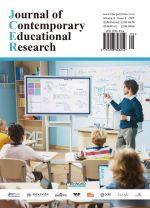Research on the Reform of the “Ecotourism” Course Based on the OBE Concept in the Context of Intelligent Education
Abstract
Under the background of intelligent education, the traditional teaching model of “ecotourism” has become increasingly problematic and is no longer able to meet the needs of talent cultivation. Based on the OBE (Outcomes-Based Education) concept, this study explores the necessity, pathways, and methods for the reform of the “ecotourism” course. By reconstructing the teaching objective system oriented towards student learning outcomes, optimizing teaching content and methods, and innovating the evaluation mechanism; and by integrating teaching resources with intelligent education technologies to build a blended online-offline teaching model, the course can better meet industry needs and student development, thereby cultivating high-quality talents that can adapt to the new era of ecotourism development.
References
Gu Z, Zhang J, Zhou C, 2022, Information Technology-Driven Reforms in Tourism Vocational Education: Logical Foundations, Challenges of Change, and Innovative Pathways. Heilongjiang Higher Education Research, 2022(2): 122–126.
Jiang X, Shao M, Shi J, 2025, Empowering Intelligent Education in Universities With “AI + Digital Twinning” Iterative Integration, Application Scenarios, and Practical Approaches. Journal of Heilongjiang Institute of Technology, 39(1): 60–70 + 80.
Zhang X, Yang L, Pan D, et al., 2024, Research on Blended Teaching of Food Hygiene and Safety in Food Nutrition Major Based on OBE Model in the Context of New Engineering. Modern Food, 30(14): 90–92.
Damit M, Omar M, Puad M, 2021, Issues and Challenge of Outcome-Based Education (OBE) Implementation Among Malaysian Vocational College Teachers. International Journal of Academic Research in Business and Social Sciences, 11(3): 197–211.
Cao Y, Liu Y, Lai J, 2025, Leveraging Artificial Intelligence in Outcome-Based Education: A Case Study of Undergraduate Auditing Curriculum. Advances in Applied Sociology, 15: 60–74.
Li C, Qi C, Wang L, 2024, Exploration of Blended Teaching in the “Introduction to Tourism Studies” Course Based on the OBE Concept. Western China Quality Education, 10(22): 147–150.
Qin Y, 2019, Exploration of Teaching Reform on the Course of “Ecotourism” — Taking Wuzhou University as an Example. Journal of Higher Education, 20: 128–130.
Lin K, Guo J, Yuan X, 2023, Reform and Practice of “Ecotourism” Applied Curriculum under the Background of New Liberal Arts. Journal of Wuyi University, 42(7): 96–100.
Li D, Wei X, Zhang H, et al., 2025, Deep Learning Ensemble Strategies in Outcome-Based Education: The Influence of Ideology and Politics on Vocational Training. International Journal of Information and Communication Technology, 26(19): 18–33.
Wu Y, 2024, The Application and Value of Information Technology in Classroom Teaching in Higher Education Institutions. Shaanxi Education, 2024(8): 32–34.
Chen Q, Tu Y, 2025, Intelligent Education Empowers the Digital Transformation of Higher Education Teaching. Education and Examinations, 2025(3): 64–70 + 77.
Zhang L, 2024, Exploration of Blended Teaching in Marketing Courses in the Context of Intelligent Education. Journal of Shandong Institute of Commerce and Technology, 24(1): 57–60.
Xu H, 2021, Research on Online and Offline Blended Network Teaching in Higher Education Institutions in the Context of Intelligent Education. The Guide of Science & Education, 27: 7–9.
Wang L, Lu H, Liu X, 2025, Exploration of Teaching Practice Reform in “Psychological Research Methods” Based on Outcome-Based Education Principles. Education and Teaching Forum, 28: 69–72.

